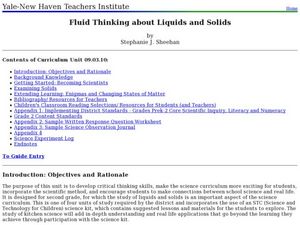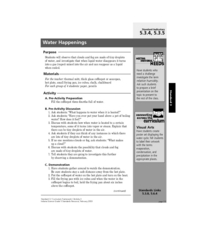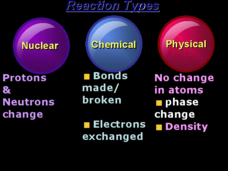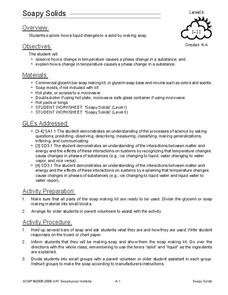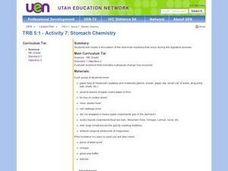Curated OER
Dry Ice: Simply Sublime
A fascinating lesson on states of matter is here for your young scientists. Dry ice is used to challenge learners preconceived notions about how solids work. They discover all sorts of interesting facts about states of matter from...
Curated OER
What's the Matter with My Snow?
Students collect snow samples around their school. They explore the concepts of density and phase change as well as the math skills of measurement and statistics. Students explore the water cycle through an interactive, down loadable...
Curated OER
What's the Matter? Where Did it Go?
Eighth graders analyze questions posted on a large poster in the room and work in groups to record their response to the question on paper, rotating to the next question after two minutes have passed. They review the characteristics of...
Steinhardt Apps
Kinetic Molecular Theory
Building off young chemists' knowledge of the states of matter, kinetic molecular theory is the focus of the unit. Eight days of lessons including multiple demonstrations, one lab experiment, directed instruction, and worksheets,...
Curated OER
Fluid Thinking About Liquids and Solids
Second graders examine the physical characteristics of the different states of matter. For this chemistry lesson, 2nd graders observe how matter changes from one phase to another. They classify substances according to its type of matter.
Curated OER
Heat And Heat Transfer
Students role play molecules in a container as the container is heated to develop a definition of heat and temperature. They also observe demonstrations of conduction, convection, radiation, and phase transfer. Using these observations...
Curated OER
Warming by Freezing
Ninth graders discover the reasoning behind spraying water on fruit and seedlings in preparation for hard freezes. In this conceptual physics lesson plan, 9th graders conduct an experiment to measure the heat released when water goes...
Curated OER
Chemistry: States of Matter Quiz
In this chemistry instructional activity, 11th graders take a states of matter quiz by matching 10 terms to their definitions, decide if 10 statements are true or false, and answer 2 fill in the blank questions.
Curated OER
Water Happenings
Fifth graders observe how water changes phase through a teacher-led demo. In this earth science lesson, 5th graders relate the demo to the water cycle. They draw and label each stage of the cycle.
Curated OER
Nothing New? A Physical Change
Fifth graders discuss the differences between chemical and physical changes. In groups, they complete experiments and discover how a physical chnage can be reversed. To end the lesson, they review the steps of the water cycle and...
Curated OER
11 - The Heat Is On
Pupils observe physical change of melting by observing substance in original state, melting substance, allowing substance to return to original temperature, determining if substance retained its original properties, and recording results.
Virginia Department of Education
Thermochemistry: Heat and Chemical Changes
What makes particles attract? Here, learners engage in multiple activities that fully describe colligative properties and allow the ability to critically assess the importance of these properties in daily life. Young chemists conduct...
Virginia Department of Education
States of Matter
Scientists have been studying exothermic reactions before they were cool. The lesson begins with a discussion and a demonstration of heat curves. Scholars then determine the heat of fusion of ice and the heat needed to boil water through...
Curated OER
States of Matter
In this states of matter activity, students read a 2 page article on the 5 states of matter, answer statements with multiple choice answers, fill in 4 fill in the blank statements and 3 true or false statements about the 5 states of matter.
Curated OER
Creative Expressions: Phase Changes
Learners place themselves in the position of a water molecule, ice molecule, or steam molecule and then describe the process of changing phase.
Curated OER
Brain POP - States of Matter
In this states of matter worksheet, students visit the website http://www.brainpop.com/science/matter and watch a movie to complete 7 fill in the blank questions, 5 matching questions, and an 18 clue crossword.
Curated OER
Doin' The Moonwalk
If you are looking for an outstanding lesson on the Moon for your budding astronomers, look no further! This outstanding plan is full of wonderful, meaningful activities for your charges to engage in. Pupils will discover why there are...
Messenger Education
Cooling with Sunshades
Messenger's sun shade measures 8 ft x 6 ft and will have temperatures reaching 700 degree Fahrenheit on the outside while maintaining a cool 70 degrees underneath. In the third activity of four, groups discuss the basic properties of...
Curated OER
Chemistry Slide Collection
A huge slide show provides a review of almost every topic there is to cover in basic chemistry! Your young scientists will be interested to see each illustration and example given. The appearance of the 120 slides varies greatly, most...
Curated OER
Soapy Solids
Young scholars observe and explain how a change in temperature causes a physical change in a substance. In this physical science lesson plan, students use a soap making kit to observe the effects of adding heat to the bar soap as they...
Curated OER
Stomach Chemistry
Fifth graders compare physical and chemical changes. They perform a simulation experiment/activity that replicates what happens in the stomach as food is digested by stomach acids.
Curated OER
Changes of State
Students examine molecules and the changes in energy of a system. In this energy systems lesson students complete a lab activity and describe changes of state.
National Nanotechnology Infrastructure Network
Making a Liquid Crystal Thermometer
Introduce your classes to a fourth state of matter! Liquid crystals have a colorful sheen that changes based on different physical factors. Learners use this information to create a liquid crystal thermometer where the color of the...
Curated OER
Sometimes, solid + liquid = gas
Third graders experiment with common household liquids and solids. In this chemical reaction lesson, 3rd graders discuss phase changes and experiment to find other ways to create gases. They use water, vinegar, lemon juice, flour, baking...






